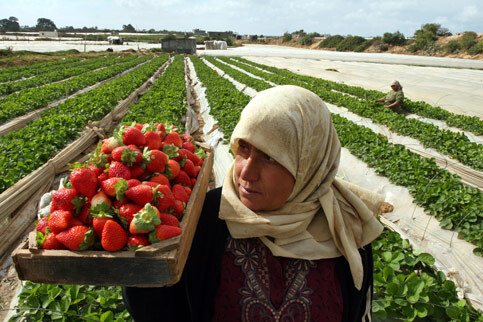Palestinian Center for Human Rights 12 August 2008

A Palestinian woman works in a strawberry field in the Gaza Strip, November 2007. (Wissam Nassar/MaanImages)
Strawberry and cut flower farming are two of the most important productive agricultural sectors in the Gaza Strip. They contribute approximately US $25 million to the gross national product. In addition, both sectors employ thousands of farmers in direct and indirect employment. The export season for strawberries lasts from 20 November until 15 January and the export season for cut flowers is from 15 November until 25 April.
Since the outbreak of second Palestinian intifada on 29 September 2000, these two agricultural sectors have been subjected to various impediments caused by the procedures imposed on border crossings, especially al-Mentar (Karni) Crossing that is the only outlet allowing exports.
This report aims to shed light on the impact of the ongoing siege and closure of border crossings on the Gaza Strip exports of strawberries and cut flowers. The report addresses how the impact of the closure reflects on the people’s enjoyment of their economic and social rights, especially the right to adequate living conditions and the right to work. It covers the period from 20 November 2007 until the time of publication, which covers the 2007-2008 export season for strawberries and cut flowers. It is intended for the report to draw the attention of the international community on the policies and practices of the Israeli occupation against approximately 1.5 million people living in a large prison in the Gaza Strip, in violation of international humanitarian law, especially the Fourth Geneva Convention (1949).
Background on strawberry and cut flower farming in the Gaza Strip
The total land area of the Gaza Strip is 365 square kilometers. The farmland land is about eight percent of the total area, approximately 30,000 dunams (one dunam equals 1,000 square meters), cultivated with mostly citrus trees, vegetables and fruits. Since the establishment of the Palestinian National Authority (PNA) in 1994, new agricultural sectors were developed for their high income. These new sectors included strawberries and cut flowers. The total farmland area for these two sectors is estimated at 2,700 dunams, with 2,200 dunams for strawberries and 500 dunams for cut flowers. Strawberry farming is concentrated in the Beit Lahiya area in the northern Gaza Strip, whereas cut flower farming is concentrated in the southern Gaza Strip areas of Rafah and Khan Younis.
Strawberry and cut flower farming require special treatment and care, which relatively increases their costs. The estimated cost for one dunam of strawberry farms is US $3,473 (totaling approximately US $7.64 million for the sector); and one dunam of cut flower farms costs approximately US $10,000 to cultivate (totaling approximately $US five million for the sector).
Despite the relatively small area of farmland used for these two sectors, they are considered two types that enjoy high economic and social value. Strawberries’ annual income is estimated at US $10-12 million and cut flowers’ annual income is approximately US $13 million. In addition, both sectors contribute to the creation of employment opportunities. Strawberry farmers are estimated at 450; and cut flower farmers are about 60. Indirect employment opportunities related to the two sectors (production, marketing, services, etc.) are estimated at 7,500 jobs from the strawberry sector and approximately 800 from the cut flower sector.
Engineer Jaber Qarmout from the Palestinian Ministry of Agriculture indicated that strawberries and cut flowers are exported under an agreement between an Israeli company and Gaza’s farmers. Accordingly, the Israeli company purchases the strawberry and cut flower produce from farmers under various quality specifications, then the company exports the produce to Europe. It is noted that the Israeli company purchases the strawberry and cut flower produce from Gaza farmers in order to cover a deficit in Israeli production in these two sectors exported to Europe under agreement with the EU. Since Israeli farmers cannot cover the quantities stated in the agreement between the Israeli company and the EU, the company resorted to purchasing from Gaza’s farmers to cover the required amount. The export process, according to the agreement, goes through different phases:
- Inspection by the Palestinian Ministry of Agriculture: farmers transport their produce to specific stations designed for inspection. The Ministry’s agricultural engineers inspect the produce to ensure its compatibility with the required specifications, including absence of insecticides.
- Inspection by the Israeli company: after the Ministry’s inspection, the Israeli company takes a sample of the produce to ensure its compatibility, noting that the inspection process requires three to four days. During this period, the produce is shipped to al-Mentar (Karni) Crossing. If the Israeli company discovers any flaws, the shipping is halted.
- Shipping: after the inspection process is completed, the produce is shipped to al-Mentar Crossing, and from there to Ben Gurion Airport, where it is shipped by cargo plane to the export destination.
Download the full report [PDF]
Related Links